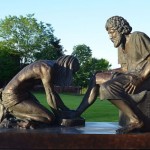 1 Corinthians 6:1-11
1 Corinthians 6:1-11
Though Paul’s letters are not usually laid out as a whole in terms of a logical argument, I think it’s still possible to discern a pattern or picture in his teachings to the Corinthians. Paul’s overall message through much of 1 Corinthians is that he wants the Church, including the Church at Corinth to live as God’s Temple, His people whom He has redeemed and built together for His glory and their edification.
With this grand goal in mind, Paul talks in Chapter 3 about how we are the Temple of the Holy Spirit through which Christ dwells in us. In Chapter 4 Paul continues this theme by reminding us that we are stewards of the mysteries of God, which is Christ in us and gives us examples of how he endures all things in love. But since not all of the Corinthians or all Christians choose to live in love and obedience as God’s holy Temple, in Chapter 5 Paul finds it necessary to speak of the authority of the Church to discipline unrepentant sinners.
Now, in Chapter 6, Paul continues speaking about the lack of love in some of the Corinthians and the tragic consequences that a life without holiness, repentance, and love (all essential sides of the same life in Christ) inevitably leads to.
God has chosen to share His immeasurable treasure, which is Himself, with His children. His is the Kingdom and the power and the glory, and through His Son, both God and man, He shares Himself and His Kingdom, power, and glory with His people. But sadly, when we refuse Him we are also refusing His good gifts.
The glory of mankind, redeemed by Jesus Christ through a life of faith in Him, is that we are now made higher than the angels. Paul teaches that some day, Christians will, in fact, judge the angels. But when we prove unable to judge ourselves, we give up this glory for our own, paltry, evaporating glory. Though we should be able to judge the angels, instead we are not even able to judge ourselves, and so we take each other to the civil courts. Watching recently as a couple heads towards divorce, I was struck by the fact is that it is a lack of love for and obedience to God that leads us to divorce and division and lawsuits, and it’s a lack of love for God that leads to a lack of love for one another.
The lawsuits that the Corinthians were experiencing, as well as our own sad divisions and disputes, reveals not only the glory of God we’ve given up but His power as well. The power of God is able to make a man and wife one flesh; the power of God is able to make God man; and the power of God is able to unite sinful men to Himself through the Blood of Jesus Christ. And God has shared this power. But when we pursue our own sinful policies, we lose the power of God, which is the power of the Holy Spirit in us. No holiness = no God = no power.
Why do we so willing give up this power and glory? We do it all for the sake of self, the very thing that has alienated us from God and each other to begin with. We willingly trade the power and glory of God in our lives for a little sinful selfishness.
At the heart of the Corinthians’ failings (and ours) is a loss of love, and where there is not love people hurt each other.
The origin of the lawsuits of the Corinthians and our own disputes, divisions, and divorces is our lack of love. One brother has something against another brother, and there is sin in how we have wronged each other. But this sin is compounded by the fact that we are not merely sinning in the abstract or even just sinning against our own bodies or souls: no, often when we sin, we sin against our brothers and sisters in Christ. Let me put this more bluntly: often, we sin against Jesus Christ in us, against the Temple of the Holy Spirit.
It gets worse. Rather than accepting being wronged, we insist on the right to get back at the person who’s wronged us. All that it takes for a dispute to end sometimes is for one person to give in, even if that person is more sinned against than sinning.
I don’t think Paul is teaching that we never have a right to seek justice. But if the choice is between bringing shame on Christ through dragging a brother or sister in Christ through a civil court and allowing oneself to be wronged, Paul is asking us which is worse. Better still, of course, why not bring the matter before the Church? Hasn’t God given us His wisdom, which is Christ? Hasn’t He given us the ability and power to judge even the angels? Yet we won’t trust ourselves to the Church. Has it really come to this – that we trust the civil courts more than the Church? Or is it just that we think we have a better chance of getting our way through the civil courts?
All of this tragedy comes as a result of our lack of love, which is a lack of Jesus Christ in our lives. Weren’t you washed by the Blood of the Lamb? Weren’t you sanctified and justified? (verse 11.) Then how is it that we still choose such selfish ways?
Our inability to settle our own disputes in love and through the Church reminds me of children, who wage these petty wars and will not stop to be governed by God’s Holy Spirit. More often than is necessary, the adults have to be dragged into things. Are we no better than children?
The worst part of all is that if we persist in our sin, we lose not only God’s power and glory but also His kingdom. In verses 9 and 10 Paul lists some of the sins which, if continued without repentance, will mean we will not inherit the Kingdom of God. These are chilling words, but if we persist in a life of unrepentant sin, then we have no part in God’s kingdom and will be disinherited.
There is a wide variety of sins listed here, and many more could be added to this list. Perhaps most notable in this list to our own present culture are the categories of homosexuals and sodomites. God’s Word, both in the Old and New Testament is clear: homosexuality is a sin. If you lead a life of homosexuality and refuse to repent, you will not inherit the Kingdom of God.
There are 2 errors we often make, though. First, notice that homosexuality in this passage is in the same category as fornicating (any sex outside of marriage), stealing, and coveting. Homosexuality is clearly a sin – but then so are many other things. We should be careful not to follow the culture in giving it a special category apart from other (sinful) behavior.
The second error is in calling God a liar and saying that homosexuality is not a sin. “But I know lots of good people who are homosexuals.” I’ve heard this many, many times from young people who are Christians. In saying this, they are (often without meaning to) calling God a liar. They are judging by their own experience and thoughts, clouded by sinfulness. We could just as easily say of many adulterers, murderers, thieves, and idolaters (and liars, coveters, gossipers, etc.): “But I know them, and they’re good people.”
Why do we pay so much attention to homosexuality, then, if it is a sin just like many other behaviors? My own belief is that it is precisely because many homosexuals and others do not believe it is a sin, and they defiantly and proudly advocate “equal rights” for sinful behavior. The difference lies in this: I don’t hear a lot about adulterers, rapists, murderers, thieves, or extortioners saying “Give me equal rights and tax breaks because I’m an adulterer, rapist, murderer, thief, or extortioner. I have a special right to come before God without asking for forgiveness of my sins.” The Christian alcoholics I know who are trying to be faithful to God acknowledge they have a problem and need help, instead of televising, “I’m a drunkard and you can’t tell me it’s wrong to get drunk. I refuse to get help or go for counseling. Now you must serve me the Lord’s Supper.”
The problem with homosexuality is not with homosexuals who acknowledge their sin before God and are asking for forgiveness and help, but with homosexuals who refuse to acknowledge their sin before God at all. Likewise, the problem with _________ is not ________ists who acknowledge their sin before God and ask for forgiveness and help, but with __________ists who refuse to acknowledge their sin before God.
If you are a Christian, God has washed you with the Blood of His Son. He has sanctified and justified you in the name of Jesus Christ and by the Spirit of God. He has even shared His kingdom, and power, and glory with you. But to receive this treasured inheritance, you must learn to judge yourself and to live in love and obedience to God, repenting of the sins for which He died.
Prayer: Our Father, who art in heaven, hallowed be Thy name. Thy kingdom come. Thy will be done, on earth as it is in heaven. Give us this day our daily bread. And forgive us our trespasses, as we forgive those who trespass against us. And lead us not into temptation, but deliver us from evil. For thine is the kingdom, and the power, and the glory, for ever and ever. Amen.
Points for Meditation:
1. Meditate on the treasure that God has shared with His people: first, Himself, but also His Kingdom, power, and glory.
2. Meditate on the mercy and forgiveness of God that comes to all truly penitent sinners, regardless of their sins.
Resolution: I resolve to consider the ways in which I may be sinning against my brother or against God. I resolve to judge my own life and freely confess any sins that God brings to my attention.
© 2013 Fr. Charles Erlandson












